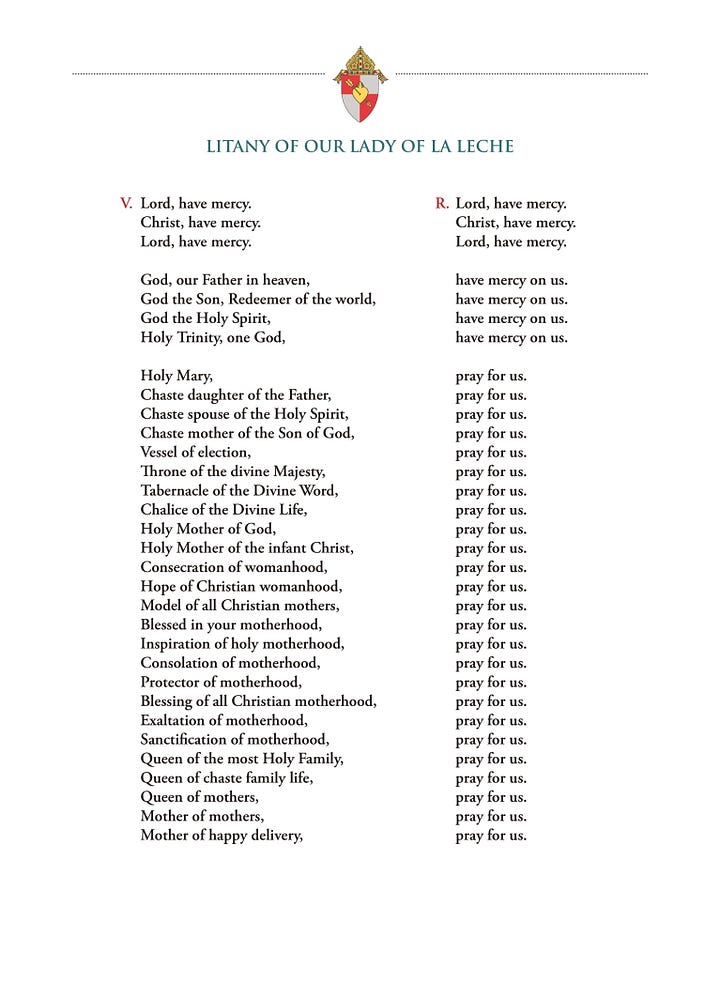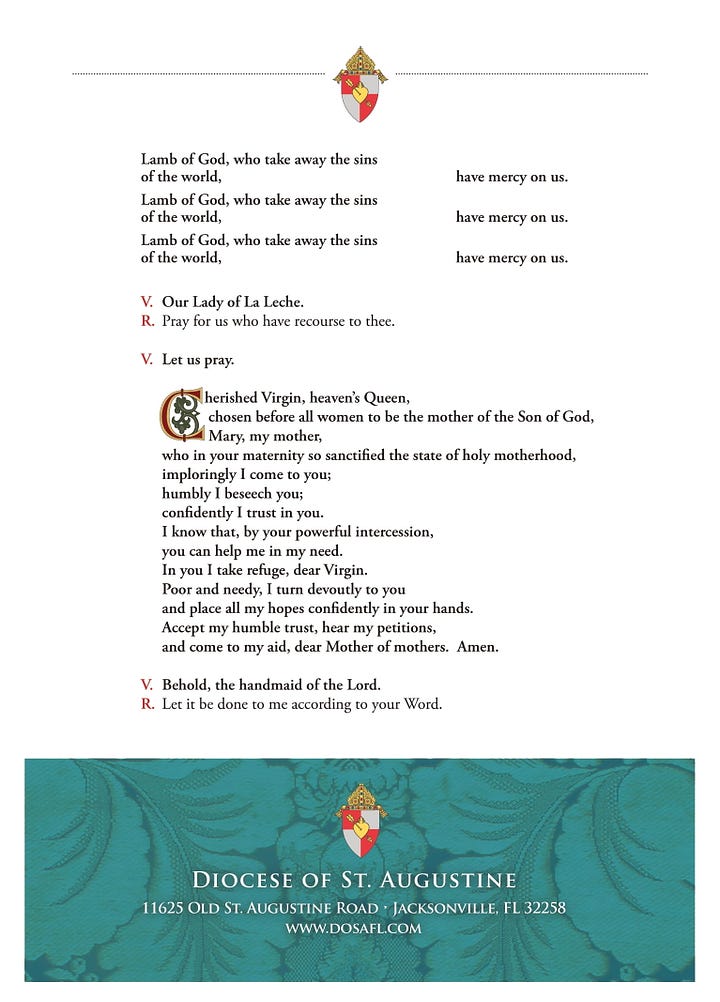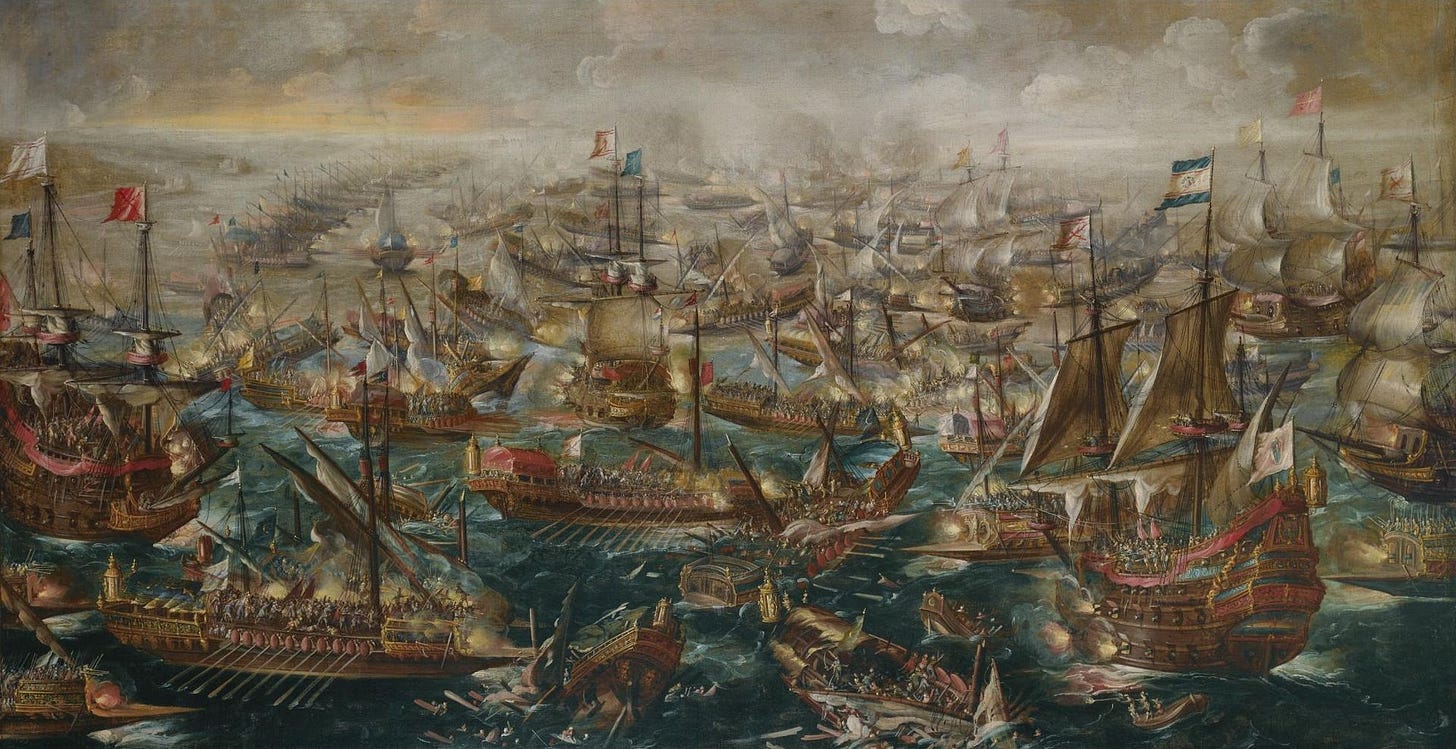Day 6 of the Novena to Our Lady of La Leche, Patroness of Florida
Feast of Our Lady of Victory plus a Prayer against Storms
Please join us in praying for the defeat of Amendment 4 in Florida, for the consecration of Florida to the Sacred Heart of Jesus and Immaculate Heart of Mary, and the dissipation of Hurricane Milton.
Lovely Lady of la Leche, most loving Mother of Jesus, and my mother, listen to my humble prayer. Your motherly heart knows my every wish, my every need. To you only, his spotless Virgin Mother, has your Divine Son given to understand the sentiments which fill my soul. Yours was the sacred privilege of being the Mother of the Savior. Intercede before him now, my loving mother, that in accordance with his will (mention your request here). This I ask, O Lady of La Leche, in the name of your Divine Son, my Lord and Savior. Amen.
V. O Mary, conceived without sin.
R. Pray for us who have recourse to you.
Our Lady of La Leche, pray for us.


The Prayer or Blessing Against Storms
At each ‘†’, make the Sign of The Cross
Jesus Christ a King of Glory has come in Peace.† God became man,† and the Word was made flesh.† Christ was born of a Virgin.† Christ suffered.† Christ was crucified.† Christ died.† Christ rose from the dead.† Christ ascended into Heaven.† Christ conquers.† Christ reigns.† Christ orders.† May Christ protect us from all storms and lightning† Christ went through their midst in Peace,† and the word was made flesh.† Christ is with us with Mary.† Flee you enemy spirits because the Lion of the Generation of Juda, the Root David, has won.† Holy God!† Holy Powerful God!† Holy Immortal God!† Have mercy on us. Amen!
The Battle of Lepanto
The battle began around noon on October 7, 1571, and when it did, the wind was working against the Christians' ships. But the wind suddenly shifted, and by that evening, it was all over. Within a few hours, the Christians soundly defeated the Muslims, killing 30,000 of them (7,500 Christians were lost), liberating thousands of Christian slaves, and destroying 117 of the Muslims' 189 galley ships and about a quarter of their galiot ships. 10,000 Muslims were taken prisoner.
All of October is especially devoted to the Holy Rosary, but because of the Christian victory at Lepanto, Pope Pius V ordered that the first Sunday of October be set aside especially to appreciate the devotion and to honor the Blessed Virgin as Our Lady of Victory. He also bestowed upon Mary the title ofAuxilium Christianorum(Help of Christians), adding it to theLitany of Loreto. Clement XI extended the feast to the entire Church, and Pius X later fixed its celebration on October 7, which is when we celebrate it today -- the Rosary as aspiritual weaponthat begs Our Lady of Victory to act as the Help of Christians. Consider these words from Pope Leo XIII'sSupremi Apostolatus Officio:
This devotion, so great and so confident, to the august Queen of Heaven, has never shone forth with such brilliancy as when the militant Church of God has seemed to be endangered by the violence of heresy spread abroad, or by an intolerable moral corruption, or by the attacks of powerful enemies. Ancient and modern history and the more sacred annals of the Church bear witness to public and private supplications addressed to the Mother of God, to the help she has granted in return, and to the peace and tranquillity which she had obtained from God. Hence her illustrious titles of helper, consoler, mighty in war, victorious, and peace-giver. And amongst these is specially to be commemorated that familiar title derived from the Rosary by which the signal benefits she has gained for the whole of Christendom have been solemnly perpetuated. There is none among you, venerable brethren, who will not remember how great trouble and grief God's Holy Church suffered from the Albigensian heretics, who sprung from the sect of the later Manicheans, and who filled the South of France and other portions of the Latin world with their pernicious errors, and carrying everywhere the terror of their arms, strove far and wide to rule by massacre and ruin. Our merciful God, as you know, raised up against these most direful enemies a most holy man, the illustrious parent and founder of the Dominican Order. Great in the integrity of his doctrine, in his example of virtue, and by his apostolic labours, he proceeded undauntedly to attack the enemies of the Catholic Church, not by force of arms; but trusting wholly to that devotion which he was the first to institute under the name of the Holy Rosary, which was disseminated through the length and breadth of the earth by him and his pupils. Guided, in fact, by divine inspiration and grace, he foresaw that this devotion, like a most powerful warlike weapon, would be the means of putting the enemy to flight, and of confounding their audacity and mad impiety. Such was indeed its result. Thanks to this new method of prayer-when adopted and properly carried out as instituted by the Holy Father St. Dominic-piety, faith, and union began to return, and the projects and devices of the heretics to fall to pieces. Many wanderers also returned to the way of salvation, and the wrath of the impious was restrained by the arms of those Catholics who had determined to repel their violence.
The efficacy and power of this devotion was also wondrously exhibited in the sixteenth century, when the vast forces of the Turks threatened to impose on nearly the whole of Europe the yoke of superstition and barbarism. At that time the Supreme Pontiff, St. Pius V., after rousing the sentiment of a common defence among all the Christian princes, strove, above all, with the greatest zeal, to obtain for Christendom the favour of the most powerful Mother of God. So noble an example offered to heaven and earth in those times rallied around him all the minds and hearts of the age. And thus Christ's faithful warriors, prepared to sacrifice their life and blood for the salvation of their faith and their country, proceeded undauntedly to meet their foe near the Gulf of Corinth, while those who were unable to take part formed a pious band of supplicants, who called on Mary, and unitedly saluted her again and again in the words of the Rosary, imploring her to grant the victory to their companions engaged in battle. Our Sovereign Lady did grant her aid; for in the naval battle by the Echinades Islands, the Christian fleet gained a magnificent victory, with no great loss to itself, in which the enemy were routed with great slaughter. And it was to preserve the memory of this great boon thus granted, that the same Most Holy Pontiff desired that a feast in honour of Our Lady of Victories should celebrate the anniversary of so memorable a struggle, the feast which Gregory XIII. dedicated under the title of "The Holy Rosary." Similarly, important successes were in the last century gained over the Turks at Temeswar, in Pannonia, and at Corfu; and in both cases these engagements coincided with feasts of the Blessed Virgin and with the conclusion of public devotions of the Rosary. And this led our predecessor, Clement XL, in his gratitude, to decree that the Blessed Mother of God should every year be especially honoured in her Rosary by the whole Church.
Lepanto
White founts falling in the courts of the sun,
And the Soldan of Byzantium is smiling as they run;
There is laughter like the fountains in that face of all men feared,
It stirs the forest darkness, the darkness of his beard,
It curls the blood-red crescent, the crescent of his lips,
For the inmost sea of all the earth is shaken with his ships.
They have dared the white republics up the capes of Italy,
They have dashed the Adriatic round the Lion of the Sea,
And the Pope has cast his arms abroad for agony and loss,
And called the kings of Christendom for swords about the Cross,
The cold queen of England is looking in the glass;
The shadow of the Valois is yawning at the Mass;
From evening isles fantastical rings faint the Spanish gun,
And the Lord upon the Golden Horn is laughing in the sun.
Dim drums throbbing, in the hills half heard,
Where only on a nameless throne a crownless prince has stirred,
Where, risen from a doubtful seat and half attainted stall,
The last knight of Europe takes weapons from the wall,
The last and lingering troubadour to whom the bird has sung,
That once went singing southward when all the world was young,
In that enormous silence, tiny and unafraid,
Comes up along a winding road the noise of the Crusade.
Strong gongs groaning as the guns boom far,
Don John of Austria is going to the war,
Stiff flags straining in the night-blasts cold
In the gloom black-purple, in the glint old-gold,
Torchlight crimson on the copper kettle-drums,
Then the tuckets, then the trumpets, then the cannon, and he comes.
Don John laughing in the brave beard curled,
Spurning of his stirrups like the thrones of all the world,
Holding his head up for a flag of all the free.
Love-light of Spain—hurrah!
Death-light of Africa!
Don John of Austria
Is riding to the sea.
Mahound is in his paradise above the evening star,
(Don John of Austria is going to the war.)
He moves a mighty turban on the timeless houri’s knees,
His turban that is woven of the sunset and the seas.
He shakes the peacock gardens as he rises from his ease,
And he strides among the tree-tops and is taller than the trees,
And his voice through all the garden is a thunder sent to bring
Black Azrael and Ariel and Ammon on the wing.
Giants and the Genii,
Multiplex of wing and eye,
Whose strong obedience broke the sky
When Solomon was king.
They rush in red and purple from the red clouds of the morn,
From temples where the yellow gods shut up their eyes in scorn;
They rise in green robes roaring from the green hells of the sea
Where fallen skies and evil hues and eyeless creatures be;
On them the sea-valves cluster and the grey sea-forests curl,
Splashed with a splendid sickness, the sickness of the pearl;
They swell in sapphire smoke out of the blue cracks of the ground,—
They gather and they wonder and give worship to Mahound.
And he saith, “Break up the mountains where the hermit-folk can hide,
And sift the red and silver sands lest bone of saint abide,
And chase the Giaours flying night and day, not giving rest,
For that which was our trouble comes again out of the west.
We have set the seal of Solomon on all things under sun,
Of knowledge and of sorrow and endurance of things done,
But a noise is in the mountains, in the mountains, and I know
The voice that shook our palaces—four hundred years ago:
It is he that saith not ‘Kismet’; it is he that knows not Fate ;
It is Richard, it is Raymond, it is Godfrey in the gate!
It is he whose loss is laughter when he counts the wager worth,
Put down your feet upon him, that our peace be on the earth.”
For he heard drums groaning and he heard guns jar,
(Don John of Austria is going to the war.)
Sudden and still—hurrah!
Bolt from Iberia!
Don John of Austria
Is gone by Alcalar.
St. Michael’s on his mountain in the sea-roads of the north
(Don John of Austria is girt and going forth.)
Where the grey seas glitter and the sharp tides shift
And the sea folk labour and the red sails lift.
He shakes his lance of iron and he claps his wings of stone;
The noise is gone through Normandy; the noise is gone alone;
The North is full of tangled things and texts and aching eyes
And dead is all the innocence of anger and surprise,
And Christian killeth Christian in a narrow dusty room,
And Christian dreadeth Christ that hath a newer face of doom,
And Christian hateth Mary that God kissed in Galilee,
But Don John of Austria is riding to the sea.
Don John calling through the blast and the eclipse
Crying with the trumpet, with the trumpet of his lips,
Trumpet that sayeth ha!
Domino gloria!
Don John of Austria
Is shouting to the ships.
King Philip’s in his closet with the Fleece about his neck
(Don John of Austria is armed upon the deck.)
The walls are hung with velvet that is black and soft as sin,
And little dwarfs creep out of it and little dwarfs creep in.
He holds a crystal phial that has colours like the moon,
He touches, and it tingles, and he trembles very soon,
And his face is as a fungus of a leprous white and grey
Like plants in the high houses that are shuttered from the day,
And death is in the phial, and the end of noble work,
But Don John of Austria has fired upon the Turk.
Don John’s hunting, and his hounds have bayed—
Booms away past Italy the rumour of his raid
Gun upon gun, ha! ha!
Gun upon gun, hurrah!
Don John of Austria
Has loosed the cannonade.
The Pope was in his chapel before day or battle broke,
(Don John of Austria is hidden in the smoke.)
The hidden room in man’s house where God sits all the year,
The secret window whence the world looks small and very dear.
He sees as in a mirror on the monstrous twilight sea
The crescent of his cruel ships whose name is mystery;
They fling great shadows foe-wards, making Cross and Castle dark,
They veil the plumèd lions on the galleys of St. Mark;
And above the ships are palaces of brown, black-bearded chiefs,
And below the ships are prisons, where with multitudinous griefs,
Christian captives sick and sunless, all a labouring race repines
Like a race in sunken cities, like a nation in the mines.
They are lost like slaves that swat, and in the skies of morning hung
The stair-ways of the tallest gods when tyranny was young.
They are countless, voiceless, hopeless as those fallen or fleeing on
Before the high Kings’ horses in the granite of Babylon.
And many a one grows witless in his quiet room in hell
Where a yellow face looks inward through the lattice of his cell,
And he finds his God forgotten, and he seeks no more a sign—
(But Don John of Austria has burst the battle-line!)
Don John pounding from the slaughter-painted poop,
Purpling all the ocean like a bloody pirate’s sloop,
Scarlet running over on the silvers and the golds,
Breaking of the hatches up and bursting of the holds,
Thronging of the thousands up that labour under sea
White for bliss and blind for sun and stunned for liberty.
Vivat Hispania!
Domino Gloria!
Don John of Austria
Has set his people free!
Cervantes on his galley sets the sword back in the sheath
(Don John of Austria rides homeward with a wreath.)
And he sees across a weary land a straggling road in Spain,
Up which a lean and foolish knight forever rides in vain,
And he smiles, but not as Sultans smile, and settles back the blade....
(But Don John of Austria rides home from the Crusade.)
Copyright Credit: Gilbert Keith Chesterton, "Lepanto" from The Collected Poems of G. K. Chesterton. United Kingdom: C. Palmer, 1927.







